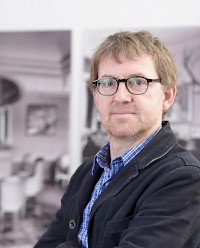Vita
Markus Stauff is an Assistant Professor for Media Studies at the University of Amsterdam. He received his PhD from the Department of Media Studies of the Ruhr-Universität Bochum in 2004 (cf. bibliography). From 1999 to 2002, he was a lecturer at the Department of Film and Television Studies (transformed 2002 into the Department of Media Studies). From March 2005 to September 2007 and from March 2008 to July 2008, he worked as a Research Assistant in the DFG research project “Media and Cultural Communications” at the Universi-ty of Cologne. From 2007 to 2008, he was a stand-in for the professorship “Media Studies, History and Theory of Visual Media” at the Hochschule für Bildende Künste in Braun-schweig. He also had teaching engagements at the FU Berlin, the University of Luzern and at the University of Dortmund. Markus Stauff co-edited the Zeitschrift für Medienwissenschaft from 2009 to 2012; from 2008 to 2012 he was on the board of the Gesellschaft für Medienwissenschaft.
Dated from 2014
Fields of research
History and theory of the television; digital media; media sports; governmentality studies and cultural studies.
IKKM Research Project
Television’s second-screen crisis and the temporal dynamics of media sport
Second-screen technologies are contributing to what, in the terms of Rick Altman, can be called a ‘crisis moment’ in media history: The industrial, aesthetic, and political practices constituting the medium now all have to deal with a situation in which established concepts and categories are undermined.
My project at IKKM is to analyze the role of media sports in this moment of crisis, especially focusing on its role in the ongoing redefinition of television’s temporality. Second-screen technologies dramatically undermine television’s established temporal characteristics (namely ‘flow’, ‘seriality’, and ‘liveness’), while at the same time translating these characteristics into the field of mobile and social media. In this process, media sports appears as much more than mere ‘content’; rather, it offers a set of cultural technologies that are quite flexibly able to harness different and even competing temporal aspects of the developing media constellation. The tension between ‘liveness’ and ‘historization’, a tension so characteristic of media sports, is especially exploited as an economically valuable strategy to guide users across different media (making it an ‘industrial aesthetic’ in the sense of John Caldwell). Yet even beyond this economic logic, the emerging strategies negotiating the relationship between the now and the past across different screens can be read as more generally indicative of the way television’s temporal dynamics have an afterlife in social media: liveness, e.g., is still of major importance but becomes a result of complex strategies involving databases, social media communication, seriality etc. Sports combines not only surprising, unpredictable events with the very predictable seriality of organized events, it also combines an emphasis on liveness and presence with a very particular organization of memory: it instantaneously condenses the most recent occurrences into highlights, results, decisive moments, and statistics. Media sports therefore makes use of micro-technologies of time, which – based on very different media forms and technologies – highlight, take advantage of, and develop crucial features of a complex and dynamic media constellation.
My research projects aims to analyze the different media formats that modern competitive sports developed to guarantee the ongoing production of a flexible, highly operational, and at the same time highly popular and contested historical knowledge; it discusses how an entire constellation of different media forms (narratives, statistics, graphics, still photographs, highlight reels, online archives etc.) is shaped by sports’ dynamics of historization and immediacy; and it will analyze how second-screen technologies take up, integrate, and invent media forms to transform, enhance, and remediate television’s established strategies of negotiating past and present.
Publications
Monographs
›Das neue Fernsehen‹. Machtanalyse, Gouvernementalität und digitale Medien. Hamburg: Lit 2005 (doctoral thesis).
Edited Books
with Marcus Krause, Marcus and Arno Meteling: The Parallax View. Zur Mediologie der Verschwörung. München: Fink 2011.
with Felix Axster, Jens Jäger and Kai Marcel Sicks: Mediensport. Strategien der Grenzziehung. München: Fink 2009.
with Daniel Gethmann: Politiken der Medien. Berlin/Zürich: diaphanes 2005.
with Ralf Adelmann, Jan-Otmar Hesse, Judith Keilbach and Matthias Thiele: Grund-lagentexte zur Fernsehwissenschaft. Theorie – Geschichte – Analyse. Konstanz: UVK 2002.
Articles
with Judith Keilbach: “When Old Media Never Stopped Being New. Television’s His-tory as an Ongoing Experiment.” In: Jan Teurlings and Marijke de Valck (eds.): After the Break. Television Theory Today. Amsterdam: Amsterdam University Press (forthcoming). “Zuschauern zuschauen. Fernsehen als social medium.” In: Andrea Seier and Thomas Waitz (eds.): Klassenproduktion. Fernsehen als Agentur des Sozialen. Münster/Hamburg/London: LIT 2013 (forthcoming). with Judith Keilbach: “Fernsehen als fortwährendes Experiment. Über die permanente Erneuerung eines alten Mediums.” In: Nadja Elia-Borer, Samuel Sieber and Georg Christoph Tholen (eds.): Blickregime und Dispositive audiovisueller Medien, Biele-feld: Transcript 2011, pp. 155-182. “Sports on YouTube.” In: Pelle Snickars and Patrick Vonderau, (eds.): The YouTube Reader. Stockholm: National Library of Sweden 2009, pp. 236–251. “The Faces of Athletes: Visibility and Knowledge Production in Media Sport.” In: FlowTV (Special Issue: Sports Media, Volume 10), October 2009. (http://flowtv.org/?p=4419) “Technik plus X: Digitalisierung und die mediale Prägung von Gesellschaft.” In: Lutz Hieber and Dominik Schrage, (eds.) Technische Reproduzierbarkeit. Zur Kultursozio-logie massenmedialer Vervielfältigung. Bielefeld: Transcript 2007, pp. 39-56. “displaced – Die Fußballweltmeisterschaft als Display des zukünftigen Fernsehens.” In: Navigationen. Zeitschrift für Medien und Kulturwissenschaften 6/2, 2006, pp. 127-144. with Ralf Adelmann: “Ästhetiken der Re-Visualisierung. Zur Selbststilisierung des Fernsehens.” In: Oliver Fahle and Lorenz Engell (eds.): Philosophie des Fernsehens. München: Fink 2006, pp. 55-76. “Instant Replay. Fernsehen und Video als Gebrauchsfilme des Sports.” In: monta-ge/av 14/2, 2005, pp. 106-124.
